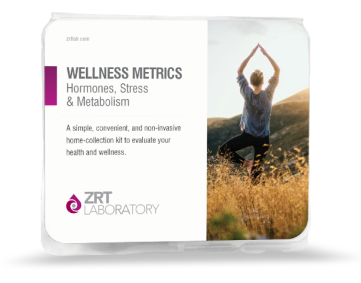Why is Wellness Testing Important
Wellness testing is necessary to maintain good health. Blood tests can help a provider determine health issues. Some of these issues include: diabetes, cancer, vitamin deficiencies, and many more. Having regular blood tests completed can assist in maintaining your overall health. With routine testing it can show/track any changes in your body over time and assist you with making the right healthy choices. It can assist in detecting health issues or potential problems starting.
Blood testing care also indicates if a current illness, disease or health concern is making progress with the treatment you are receiving. An annual wellness blood test can screen for many medical conditions. The early an onset the more likely you are to get control of the illness or deficiency. Routine blood testing will assist in a good quality of life!
Rari Lab Wellness Metrics Profile
The hormones released from the adrenal glands, the thyroid gland and the sex hormones work in harmony with each other and this helps to maintain a perfect state of balance in the body. When one or the other hormone falls out of the optimal ranges, it disturbs the efficient functioning of the body. The Wellness Metrics Profile helps to identify the hormonal imbalances that affect the general functioning of our body and this is associated with immunity, mood changes, increased fat deposition in the body, cravings for food or sugar, altered metabolism and so on. Tests that detect the increased level of risks associated with cardiometabolic disease and diabetes are also included in the Wellness Metrics Profile. There are optional add-ons that give a better understanding in case of thyroid issues or symptoms of metabolic syndrome.
People benefiting from Rari Lab Wellness Metrics Profile include
Individuals suffering from:
- Excessive fatigue
- Weight Gain
- Sugar Cravings
- Chronic Stress
And Women suffering from:
- Premenopausal symptoms associated with excess of estrogen or deficiency in progesterone
- Abnormalities associated with menstrual bleeding
- Infertility
- Abnormal growth of hair on face and body
- Menopausal symptoms
- PCOS
- Hair Loss
Benefits of Saliva and Blood Spot Testing
- Convenient collection of samples from home
- Easy deliverance of sample from home to the lab
- Samples stable at room temperature for a span of several weeks

Tests included in the Wellness Suite Profiles
WELLNESS BLOOD PANEL
Comprehensive Metabolic Panel Includes (14 tests):
- Glucose– Blood sugar level, the most direct test to discover diabetes, may be used not only to identify diabetes, but also to evaluate how one controls the disease.
- Albumin– is one of the major proteins in the blood and a reflection of the general state of nutrition. Albumin/Globulin Ratio Calculated by dividing the albumin by the globulin.
- Bilirubin-A chemical involved with liver functions. High concentrations may result in jaundice.
- Calcium–
- Carbon Dioxide- Total Used to help detect, evaluate, and monitor electrolyte imbalances.
- Chloride–
- Creatinine-. An indicator of kidney function.
- Alkaline Phosphatase- A body protein important in diagnosing proper bone and liver functions.
- Potassium- Helps to control the nerves and muscles. Similar to sodium, it helps to maintain the body’s electrolyte balance.
- Protein,Total- Together with albumin, it is a measure of the state of nutrition in the body.
- Sodium- One of the major salts in the body fluid, sodium is important in the body’s water balance and the electrical activity of nerves and muscles.
- Alanine Aminotransferase (ALT or SGPT)- is an enzyme found primarily in the liver. Abnormalities may represent liver disease.
- Aspartate Aminotransferase (AST or SGOT)- is an enzyme found in the skeletal and heart. muscle, liver, and other organs. Abnormalities may represent liver disease.
- Bun or Urea Nitrogen BUN (Blood Urea Nitrogen)– is another by-product of protein metabolism eliminated through the kidneys and an indicator of kidney function.
Renal Panel
- Albumin– is one of the major proteins in the blood and a reflection of the general state of nutrition. Albumin/Globulin Ratio Calculated by dividing the albumin by the globulin.
- Calcium–
- Carbon Dioxide- Total Used to help detect, evaluate, and monitor electrolyte imbalances.
- Chloride–
- Creatinine-. An indicator of kidney function.
- Glucose– Blood sugar level, the most direct test to discover diabetes, may be used not only to identify diabetes, but also to evaluate how one controls the disease.
- Phosphorus–
- Potassium- Helps to control the nerves and muscles. Similar to sodium, it helps to maintain the body’s electrolyte balance.
- Sodium- One of the major salts in the body fluid, sodium is important in the body’s water balance and the electrical activity of nerves and muscles.
- Bun or Urea Nitrogen BUN (Blood Urea Nitrogen)– is another by-product of protein metabolism eliminated through the kidneys and an indicator of kidney function.
Liver panel
- Protein,Total- Together with albumin, it is a measure of the state of nutrition in the body.
- Albumin– is one of the major proteins in the blood and a reflection of the general state of nutrition. Albumin/Globulin Ratio Calculated by dividing the albumin by the globulin.
- Alkaline Phosphatase- A body protein important in diagnosing proper bone and liver functions.
- Alanine Aminotransferase (ALT or SGPT)- is an enzyme found primarily in the liver. Abnormalities may represent liver disease.
- Aspartate Aminotransferase (AST or SGOT)- is an enzyme found in the skeletal and heart. muscle, liver, and other organs. Abnormalities may represent liver disease.
- GGT– Also known as Gamma-glutamyl transpeptidase, GGTP Formal name: Gamma- glutamyl transferase helps to detect liver and bile duct injury.
Fluids & Electrolytes
- Sodium- One of the major salts in the body fluid, sodium is important in the body’s water balance and the electrical activity of nerves and muscles.
- Potassium- Helps to control the nerves and muscles. Similar to sodium, it helps to maintain the body’s electrolyte balance.
- Carbon Dioxide- Total Used to help detect, evaluate, and monitor electrolyte imbalances.
Lipid Panel with Total Cholesterol: HDL Ratio
- Cholesterol, Total A sterol in the blood. Knowing your cholesterol level may be as important as knowing your blood pressure. Elevated cholesterol levels are associated with an increasing risk of coronary heart disease.
- Triglycerides are fats in the blood that are responsible for providing energy to the cells of the body. Triglycerides should be less than 400 mg/dl even while in a non-fasting state.
- HDL Cholesterol High-density lipoproteins are believed to take cholesterol away from cells and transport it back to the liver for removal or processing. They are known as the “good” cholesterol as people with high levels of HDL may have less heart disease. Low HDL could be the result of lack of exercise and smoking.
- LDL Cholesterol Low-density lipoproteins contain the largest percentage of cholesterol and may be responsible for depositing cholesterol on the artery walls. They are known as the “bad” cholesterol.
- Total Cholesterol/HDL Ratio calculated by dividing the total cholesterol by the HDL cholesterol. This is the ratio used by physicians in determining your relative risk for developing cardiovascular disease.
Thyroid Panel with Thyroid-Stimulating Hormone (TSH) – Thyroid function is critical to your metabolism and affects your energy level, weight control, heart rate, and more. The thyroid- stimulating hormone is produced in the pituitary gland and stimulates the production of thyroid hormones. The TSH helps to identify an overactive or underactive thyroid state. This comprehensive evaluation of your thyroid hormone levels includes T-3 Uptake, T4, and Thyroid-Stimulating Hormone (TSH)
Complete Blood Count (CBC) With Differential and Platelets: A complete blood count (CBC) will give valuable information about the kinds and numbers of cells in the blood, especially red blood cells, white blood cells, and platelets. A CBC helps your health professional check any symptoms, such as fatigue, weakness, or bruising, that you may have. A CBC also helps diagnose conditions such as anemia, infection, and many other disorders.
Mineral and Bone: Total Iron, Calcium, and Phosphorus
A1c (Glycohemoglobin) test evaluates the average amount of glucose in the blood over the last two to three months. This is done by measuring the concentration of glycated (also often called glycosylated) hemoglobin A1c. Hemoglobin is an oxygen-transporting protein that is found inside red blood cells (RBCs). The predominant form is hemoglobin A. In 2010, the American Diabetes Association affirmed the decision of an international expert committee recommendation to use the A1c test to diagnose diabetes with a threshold >/= 6.5%. Point-of- care A1c assays are not sufficiently accurate currently for diagnostic purposes.
Hormones Male: Testosterone
Hormones Female: FSH, LH, PROLACTIN, ESTRADIOL (pending age, and symptoms warranted)
Not included in Female Wellness (55+ Panel).
Not included in Female Wellness (Youth Panel). Must be added if medically necessary.
C-Reactive Protein (Cardiac Risk Assessment)
Vit B12,
Vitamin D 25-hydroxy.



